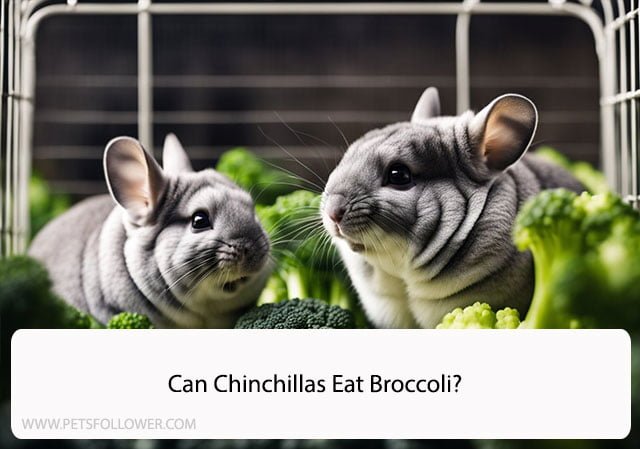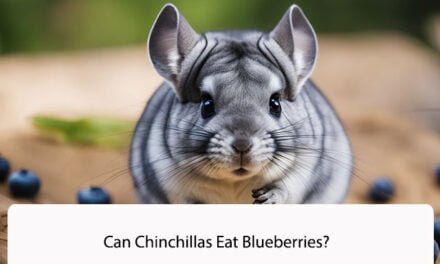Chinchillas are adorable, fluffy creatures that make great pets. As a responsible pet owner, it’s important to understand what foods are safe and healthy for your chinchilla to eat. One vegetable that you may be wondering about is broccoli. So, can chinchillas eat broccoli?
The answer is yes, chinchillas can eat broccoli, but it should be given in moderation. Broccoli is a great source of vitamins and minerals, including vitamin C, which is essential for a chinchilla’s health. However, too much broccoli can cause digestive issues and bloating. It’s important to remember that chinchillas are herbivores and their diet should consist mainly of hay and pellets. Vegetables should only be given as treats and in small quantities.
When feeding your chinchilla broccoli, it’s important to wash it thoroughly and cut it into small pieces. This will make it easier for your chinchilla to eat and digest. It’s also important to introduce new foods slowly and monitor your chinchilla for any signs of digestive upset. By following these guidelines, you can safely incorporate broccoli into your chinchilla’s diet as a healthy treat.
Understanding Chinchilla’s Diet
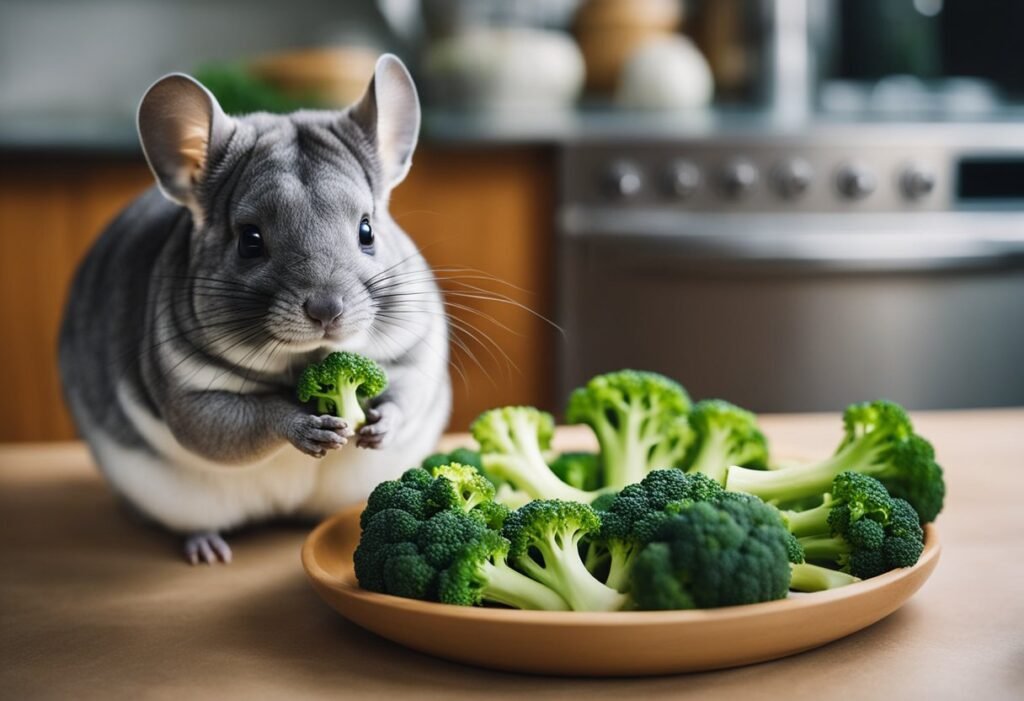
Chinchillas are herbivores, which means they eat only plant-based foods. A chinchilla’s diet should consist of hay, fresh water, and small amounts of vegetables and fruits. It is important to note that chinchillas have sensitive digestive systems, so their diet should be carefully monitored.
Hay is the most important part of a chinchilla’s diet. It provides essential fiber that helps keep their digestive system healthy. Timothy hay is the best type of hay for chinchillas, but other grass hays like orchard grass or meadow hay can also be used.
Fresh water should always be available to chinchillas. It is important to change their water daily and ensure that it is clean. Water bottles are the best way to provide water to chinchillas as they prevent spilling and contamination.
Vegetables and fruits can be given to chinchillas in small amounts as treats. Broccoli is a vegetable that chinchillas can eat, but it should be given in moderation. Too much broccoli can cause digestive problems and gas.
It is important to avoid giving chinchillas foods that are high in sugar, fat, or salt. Foods like chocolate, nuts, and processed snacks should never be given to chinchillas as they can cause serious health problems.
In summary, a chinchilla’s diet should consist of hay, fresh water, and small amounts of vegetables and fruits. It is important to monitor their diet carefully and avoid giving them foods that are high in sugar, fat, or salt. By providing a balanced and healthy diet, chinchillas can live long and happy lives.
Can Chinchillas Eat Broccoli?
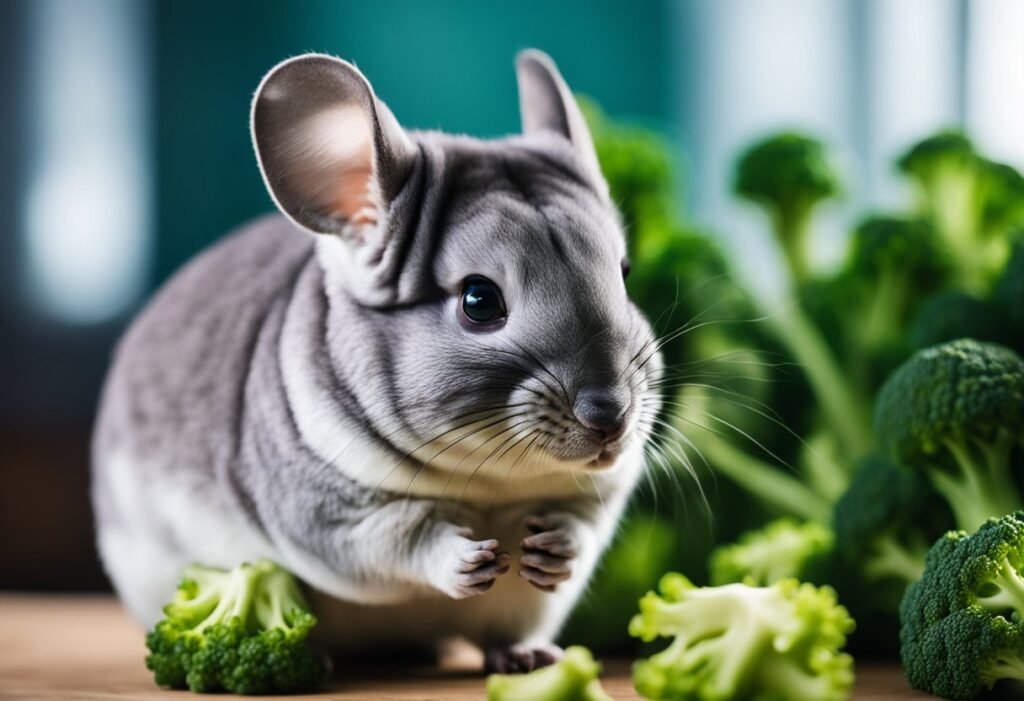
Broccoli is a vegetable that is commonly found in many households. As a chinchilla owner, you may be wondering if it is safe to feed your pet broccoli.
The answer is yes, chinchillas can eat broccoli. However, it should only be given to them in moderation. Broccoli is high in oxalates, which can lead to bladder and kidney problems if consumed in large quantities.
It is important to note that broccoli should not be the main part of your chinchilla’s diet. Their diet should consist mainly of hay and pellets, with occasional treats like broccoli.
When feeding broccoli to your chinchilla, make sure to wash it thoroughly and remove any leaves or stems that may be tough to chew. It is also important to cut it into small pieces to prevent choking.
In summary, while broccoli can be a safe and healthy treat for your chinchilla, it should only be given in moderation and should not be the main part of their diet. As always, consult with your veterinarian if you have any concerns about your chinchilla’s diet.
Potential Risks of Feeding Broccoli to Chinchillas
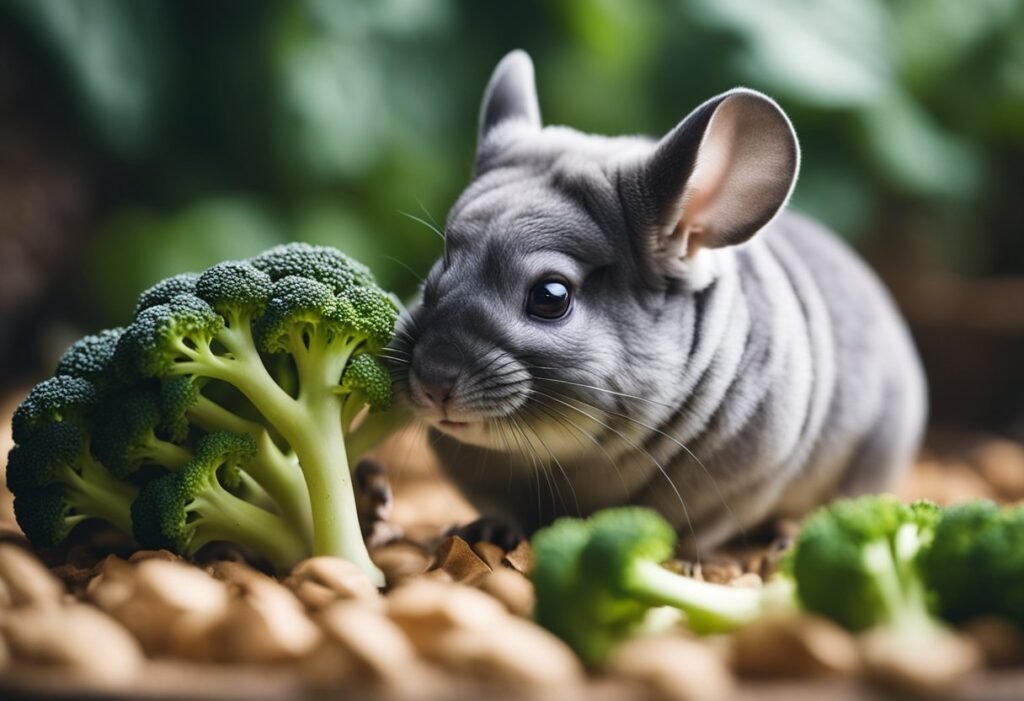
When it comes to feeding chinchillas, it is important to be aware of the potential risks associated with certain foods. While broccoli can be a healthy addition to a chinchilla’s diet, it is important to exercise caution.
One potential risk of feeding broccoli to chinchillas is the high amount of oxalates present in the vegetable. Oxalates can bind with calcium in the body, leading to the formation of kidney stones. Chinchillas are particularly susceptible to kidney stones, so it is important to monitor their oxalate intake.
Another potential risk of feeding broccoli to chinchillas is the high fiber content. While fiber is important for a chinchilla’s digestive health, too much can lead to digestive issues such as bloating and diarrhea.
It is also important to note that broccoli should be fed in moderation as it is high in carbohydrates. Chinchillas have a low tolerance for carbohydrates and too much can lead to obesity and other health issues.
Overall, while broccoli can be a healthy addition to a chinchilla’s diet, it is important to feed it in moderation and monitor their intake to avoid potential health risks.
Alternatives to Broccoli for Chinchillas
While broccoli is a safe and healthy food for chinchillas in moderation, it may not be available or affordable for everyone. Fortunately, there are many other vegetables that can be fed to chinchillas as an alternative to broccoli.
Here are some examples of vegetables that can be fed to chinchillas:
- Carrots: Carrots are an excellent source of vitamin A, which is essential for chinchillas. They are also low in sugar and high in fiber, making them a great addition to a chinchilla’s diet. However, carrots should be fed in moderation due to their high sugar content.
- Bell Peppers: Bell peppers are a good source of vitamin C, which is important for a chinchilla’s immune system. They are also low in sugar and high in fiber, making them a great choice for a chinchilla’s diet.
- Kale: Kale is a nutrient-dense vegetable that is high in vitamin A, vitamin C, and calcium. However, it should be fed in moderation due to its high oxalate content, which can interfere with calcium absorption.
- Spinach: Spinach is another nutrient-dense vegetable that is high in vitamin A, vitamin C, and iron. However, like kale, it should be fed in moderation due to its high oxalate content.
- Cucumber: Cucumbers are low in sugar and high in water content, making them a great choice for keeping a chinchilla hydrated. They are also a good source of vitamin C and fiber.
It is important to note that not all vegetables are safe for chinchillas to eat. Some vegetables, such as onions and garlic, can be toxic to chinchillas and should be avoided. It is always best to research the safety of a vegetable before feeding it to your chinchilla.
In conclusion, while broccoli is a safe and healthy food for chinchillas, there are many other vegetables that can be fed to chinchillas as an alternative to broccoli. By providing a variety of vegetables in moderation, you can help ensure that your chinchilla is getting the nutrients it needs to stay healthy.
How to Safely Introduce New Foods to Your Chinchilla
When it comes to introducing new foods to your chinchilla, it’s important to do so slowly and carefully. Chinchillas have sensitive digestive systems, and sudden changes in their diet can lead to digestive issues, such as diarrhea or bloating.
Here are some steps you can take to safely introduce new foods to your chinchilla:
- Start with small amounts: Begin by offering your chinchilla a small piece of the new food, about the size of a pea. Observe your chinchilla for any signs of discomfort, such as excessive scratching or lethargy.
- Gradually increase the amount: If your chinchilla tolerates the new food well, you can gradually increase the amount you offer. However, be sure to do so slowly, over a period of several weeks.
- Monitor your chinchilla’s health: Keep a close eye on your chinchilla’s health as you introduce new foods. If you notice any signs of illness or discomfort, such as loss of appetite or diarrhea, stop offering the new food and consult your veterinarian.
- Offer a variety of foods: Chinchillas thrive on a varied diet, so be sure to offer a variety of safe foods. This can include hay, pellets, and small amounts of fresh fruits and vegetables.
Remember, it’s important to introduce new foods slowly and carefully to avoid any potential digestive issues. By following these steps, you can help ensure that your chinchilla stays healthy and happy.
Conclusion
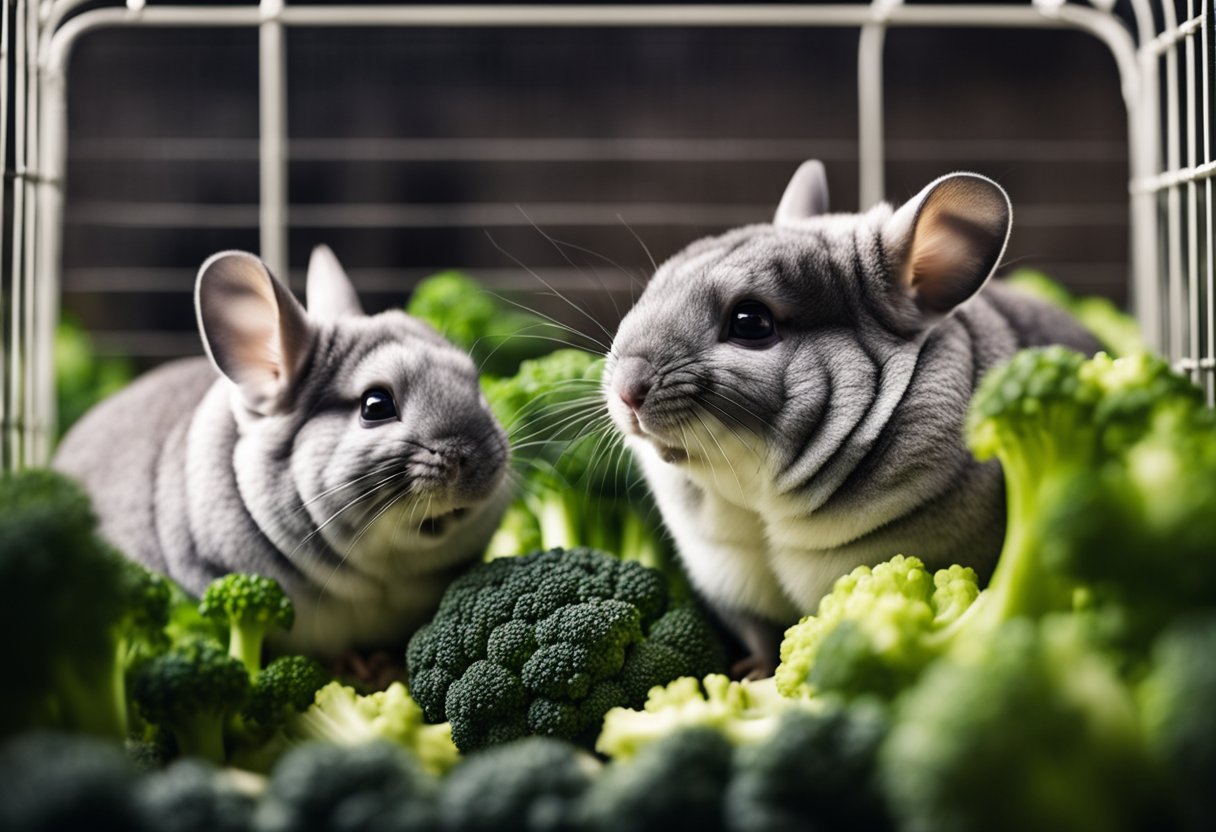
In conclusion, chinchillas can eat broccoli, but it should be given in moderation. Broccoli contains a high amount of calcium, which can lead to bladder stones if consumed in large quantities. Therefore, it is recommended to give broccoli as an occasional treat rather than a regular part of their diet.
It is important to note that chinchillas have a sensitive digestive system, and introducing new foods should be done slowly and in small amounts. If your chinchilla shows any signs of discomfort or digestive issues after consuming broccoli, it is best to avoid giving it to them in the future.
Overall, chinchillas require a balanced diet that consists mainly of hay and pellets. Fresh vegetables and fruits can be given as occasional treats, but should not make up a significant portion of their diet. As responsible pet owners, it is important to provide our chinchillas with a healthy and balanced diet to ensure their overall well-being.
Frequently Asked Questions
What vegetables are safe for chinchillas?
Chinchillas can eat a variety of vegetables such as carrots, bell peppers, and spinach. However, it’s important to remember that vegetables should only make up a small portion of their diet. Too many vegetables can cause digestive issues and diarrhea.
What fruit can chinchillas eat?
Chinchillas can eat small amounts of fruit such as apples, bananas, and strawberries. However, fruit should also be given in moderation as it contains high amounts of sugar. Too much sugar can lead to health problems such as obesity and dental issues.
What can chinchillas eat as treats?
Chinchillas can have treats such as dried rose hips, dried herbs, and small pieces of plain, unsweetened cereal. However, treats should only be given in small amounts and should not be a regular part of their diet.
Can chinchillas eat lettuce?
While lettuce is not toxic to chinchillas, it is not recommended as it contains high amounts of water and low nutritional value. Too much lettuce can cause digestive issues and diarrhea.
Can chinchillas eat kale?
Kale is safe for chinchillas to eat in small amounts, but it should not be a regular part of their diet. Kale contains high amounts of calcium which can lead to bladder stones in chinchillas.
Can chinchillas eat cucumber?
Cucumber is safe for chinchillas to eat in small amounts, but it should not be a regular part of their diet. Cucumber contains high amounts of water which can cause digestive issues and diarrhea if given in excess.

